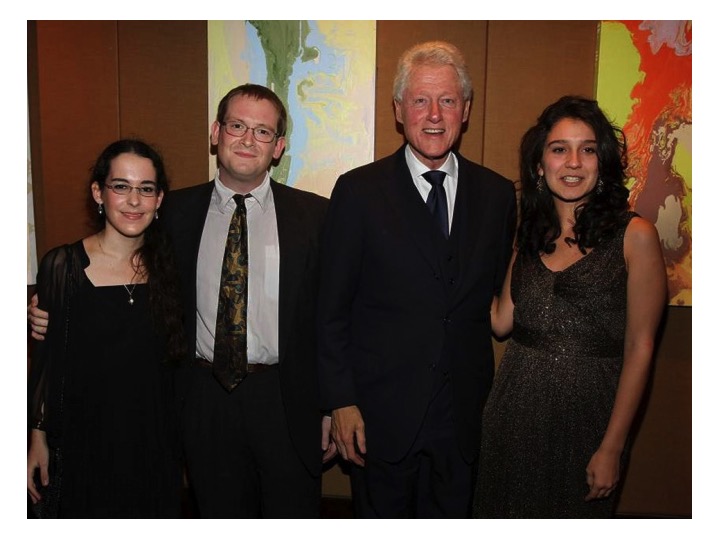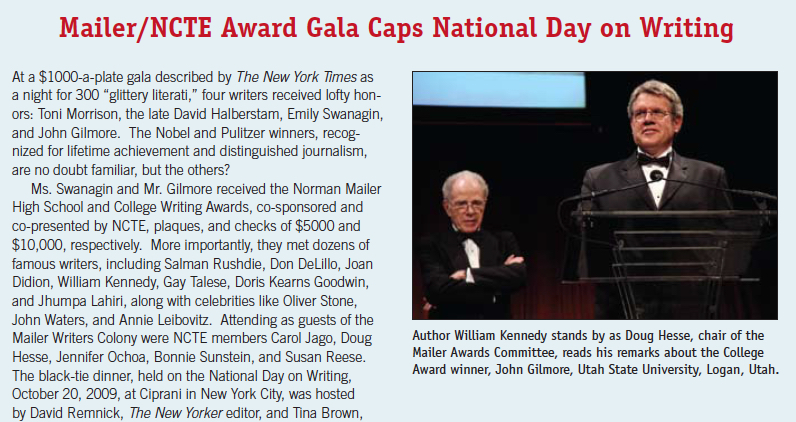
2012 student winners, plus another guy.
Alec Baldwin checked how to pronounce my name. Keith Richards sat beside Bill Clinton. It was the top floor ballroom of the Mandarin Oriental Hotel in New York, and I was introducing winners of the NCTE/Norman Mailer National Writing Awards. Along with their prizes, three students received $5000, and a South Carolina English teacher and NCTE member Kay McSpadden got a check and a plaque from Garrison Keillor who, from the podium, took particular delight that this wife of a Presbyterian minister had titled her winning story “Why Women Moan in Bed.”
I recount that evening, October 4, 2012, because NCTE is currently inviting submissions for the 2016 NCTE/Mailer Awards, in the categories of creative nonfiction and poetry. Complete information is available at http://www.ncte.org/awards/nmwa. It costs nothing to submit, but the deadline is May 2. NCTE members do initial rounds of reading up to a group of finalists, and panels of well-known writers select the winners.
Now, you may be curious, at least, about these particular awards—perhaps even skeptical. After all, Norman Mailer was a particular, sometimes polarizing figure in American letters. Further, contests themselves can be problematic, sometimes conflicting with learning. My friend and current Mailer awards chair Bonnie Sunstein, (from the University of Iowa and from whom I swiped this blog title), and I reviewed the history, the complications, and the values of these awards in a session at the NCTE Convention in 2015.
The history, in a nutshell, was that after Mailer died in 2008, Larry Schiller (author, director, photographer, Emmy winner, and co-author/friend of Mailer) contacted Kent Williamson about sponsoring student writing contests in his honor. In addition to generous funding, Schiller could bring high-level contact to the arts and entertainment world. Indeed, the people involved over the years, beyond those mentioned, have included Toni Morrison (who was once an NCTE member, she told me), Dick Cavett, Maya Angelou, Salman Rushdie, John Waters, Ken Burns, Oliver Stone, Joyce Carol Oates, Muhammad Ali, and countless others. The New York Times regularly runs a story on the awards. Kent and the Executive Committee asked me to work with Schiller, and the awards were timed in conjunction with the first National Day on Writing.
I suggested that the awards should be in creative nonfiction, among whose genres Mailer had certainly worked successful. There were plenty of fiction and poetry contests, but we needed to encourage students—and their teachers—to write memoir, personal essay, literacy journalism, and so on. Schiller agreed. The result has been a trove of student work stunning in both content and form, giving voice to the lives of high school and college writers. Consider, for example, the title of this piece, by a high school student:
“Things about My Parents I Forgot to Tell the Woman Who is Deciding Custody of My Brother, Sister, and Me”
Or these opening lines from another one:
‘Yes, my father left my family over an online game called Second Life.
No, I’m not kidding.
I wish I were.”
Or this incredible opening by a third:
“My hometown is made of break walls surrounding a harbor where young children jump off and a man who once gave me an eagle feather got drunk and floated out on a mattress to the middle of the harbor at three in the morning and was torn through with the hull of a speed boat driven by a man who’s daughter was my best friend and the owner of the bar. They had chatted that night, the killed man and the killer, and the killer told the killed man to leave his bar because he was closing down for the night and the killed man had had too much Jack Daniels to stay. That boat came up in between that man’s legs and all he left was that wife, those kids, and that eagle feather.” –Kiley Harrison
Or this first sentence from the 2010 college winner:
One day in Saigon in 1987—nine years after he had failed his escape attempt by boat, was captured, was imprisoned, ran away, was beaten unconscious and recaptured, was imprisoned, dug hundreds of thousands of spoons of dirt, ran away, was recaptured, was imprisoned, chained, and hung upside down in a cell every night, escaped with the help of a Communist friend, had arrest warrants posted on him, five years after he had settled in Dalat in his mother’s house, waited day by day for the police to come get him, met my mother, married her, and had two children—my father was hiding out and talking with his uncle, who translated American papers and documents for clients, and his uncle told him about a certain document he had translated recently, and this document explained that veterans of the Army of the Republic of Viet-Nam (ARVN) were welcome to petition for their and their family’s emigration to the United States of America. –Minh Phuong Nguyen “Suffering Self: Khồ Mình, Mình Khồ”
You can read great writing from winners on the NCTE website, including Kay McSpadden’s story that so intrigued Keillor. Just as importantly, you can encourage students to tell their own stories, explore their own lives, make a space for writing beyond reports, analyses, and arguments.

NCTE Council Chronicle story of the first Mailer awards Nov. 2009.
Doug